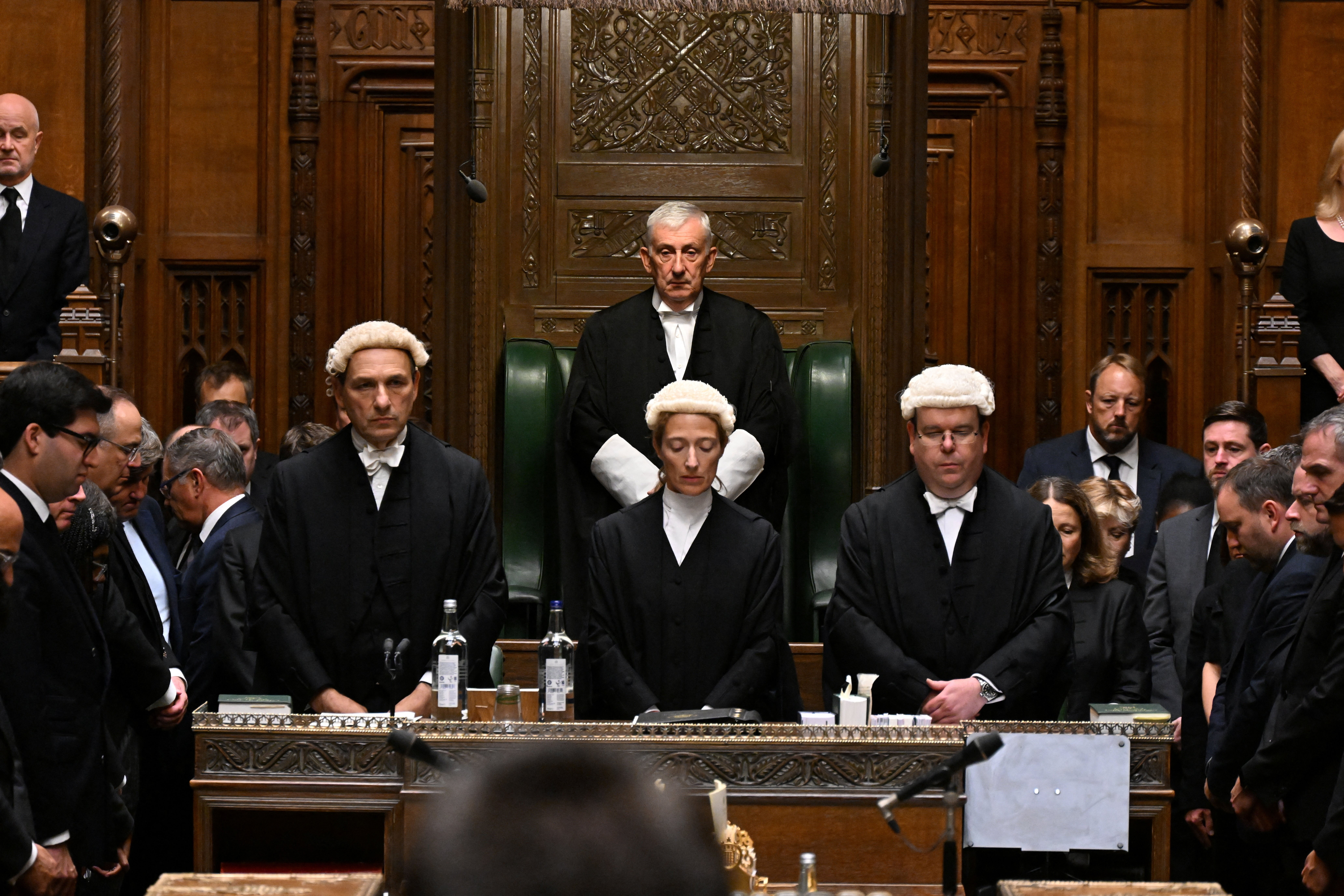Against my expectations, parliament did speak for the nation
MPs’ tributes illustrated the Queen’s success in rendering the monarchy unassailable, writes John Rentoul


When people start talking about “parliament at its best” it is usually time to make one’s excuses. Obviously, it is right that the proprieties are observed and that tributes are paid, and it is my job to observe what goes on in the House of Commons and to comment on it, but I thought this would be a dutiful task rather than an interesting one.
Instead, just as many people were surprised by their grief at the death of the Queen – Sean O’Grady, my colleague, has written movingly about it, and Boris Johnson, of all people, spoke affectingly about how he was taken unawares – I was surprised by the quality of the speeches in the Commons in tribute to her.
The new prime minister spoke plainly and well. Her first few speeches since she won the Conservative leadership election have appeared to have been written by an artificial intelligence programme, into which supposedly Thatcherite texts have been fed.
The output is coherent at sentence level, but there is no thread of argument or indeed often any connection between sentences at all. Liz Truss’s words in Downing Street on becoming prime minister contained repetitions and non sequiturs that betrayed haste and a multiplicity of authors.
Today, though, her words cohered. She quoted the Queen’s words of wartime comfort during the pandemic, when “she gave us hope that we would meet again”.
Keir Starmer, too, managed to fit his voice to the occasion. His earnestness, which sometimes grates, was softened by the seriousness of the mood in the chamber, and by some deft writing. He quoted Philip Larkin’s lines from the Queen’s silver jubilee in 1977: “In times when nothing stood / But worsened, or grew strange, / There was one constant good: / She did not change.”
It was a sentiment of such startling conservatism, Larkin at his most reactionary, that it should have sounded incongruous from a Labour leader, and yet it captured the essence of the Queen’s popularity. “The loss of our Queen robs this country of its stillest point, its greatest comfort, at precisely the time we need those things most,” he said.
This was the Commons at its respectful best, so all speeches were heard in silence, and no one heckled or intervened, but I wonder how many of those in the chamber noticed that the tributes to Her Majesty were led by a prime minister and a leader of the opposition who both wanted to abolish the monarchy in their youth. That, in a way, was the highest tribute to the success with which the Queen rendered the monarchy unassailable.
One or two MPs commented on it indirectly. John Cryer, Labour MP for Leyton and Wanstead, said that it was her achievement, and that of her father, to take an institution that was “teetering” in the 1930s and make it the most firmly supported by the British people of any of the institutions in the country.
Others did so by telling their own stories. Harriet Harman, the mother of the House, who went on an anti-monarchical awayday to France in 1981 to get away from the royal wedding (before she became an MP in 1982), recounted how, after being sacked from her cabinet post after a year of the Labour government, she received an invitation to tea from the Queen.
It was Boris Johnson who stole the show, surprising his many critics by delivering a fine speech. He was never a good parliamentary orator – his after-dinner speaking style, well-suited to TV satire shows, did not translate well to House of Commons set pieces, although he could do the knockabout effectively enough.
Now he showed he had learned something from being prime minister for three years. He said he found himself unexpectedly emotional when recording a tribute to the Queen for use after her death and the BBC asked him to refer to her in the past tense. Yes, it was all about him, but it was all about her as well. As was his recounting of his meeting with her on Tuesday: “She was as radiant and as knowledgeable and as fascinated by politics as ever I can remember, and as wise in her advice as anyone I know if not wiser.”
To keep up to speed with all the latest opinions and comment sign up to our free weekly Voices Dispatches newsletter by clicking here
He even offered some well-crafted words about the “brilliant and durable bargain of a constitutional monarchy” – the bargain that explains how, if the monarch is wise, even people who resent the hereditary principle will accept and even respect a hereditary head of state in preference to an elected president.
That is the deal that the Queen made work so well, by her discretion and care not to become embroiled in (too much) politics. It was the thread that ran through so many of the speeches today, and which gave them the quality of surprising graciousness.
Ian Blackford, Westminster leader of the Scottish National Party, called her “Queen of Scots”, which was generous after her interference in the 2014 independence referendum. Theresa May spoke of her relief at the Queen’s discretion, knowing that their weekly meetings were “the one meeting I went to which I knew would not be briefed out to the media”.
As Harman put it, “everyone, even those who don’t agree with the hereditary principle of the monarchy, cannot but marvel at her personal qualities”. That is the mark of her success, and the challenge for the King who succeeds her.




Join our commenting forum
Join thought-provoking conversations, follow other Independent readers and see their replies
Comments